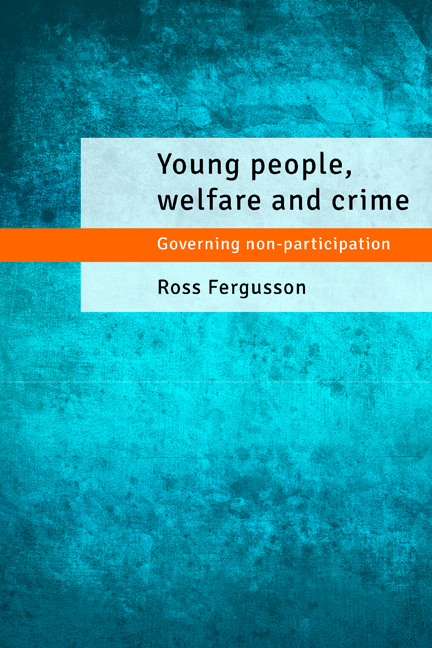Book contents
- Frontmatter
- Dedication
- Contents
- Detailed contents
- List of figures and tables
- List of abbreviations
- About the author
- Acknowledgements
- Part One The crisis of non-participation
- Part Two Work, welfare and crime: research and policy
- Part Three Theorising non-participation
- Part Four Criminalising non-participation
- References
- Copyright material
- Index
Six - Lines of division, points of entry: two theories
Published online by Cambridge University Press: 01 September 2022
- Frontmatter
- Dedication
- Contents
- Detailed contents
- List of figures and tables
- List of abbreviations
- About the author
- Acknowledgements
- Part One The crisis of non-participation
- Part Two Work, welfare and crime: research and policy
- Part Three Theorising non-participation
- Part Four Criminalising non-participation
- References
- Copyright material
- Index
Summary
… systemic disequilibria become crises only when the performances of economy and state remain manifestly below an established level of aspiration and harm the symbolic reproduction of the lifeworld by calling forth conflicts and reactions of resistance there. It is the societal components of the lifeworld that are directly affected by this. Before such conflicts threaten core domains of social integration, they are pushed to the periphery – before anomic conditions arise there are appearances of withdrawal of legitimation or motivation.
Jürgen Habermas (1981/1987) The theory of communicative action: Lifeworld and system: A critique of functionalist reason, p 385One in five young people in Britain between the ages of 16 and 24 are currently defined as NEETs … This represents about one million young people for whom everyday life is shaped by a crisis of possibility – the idea of a future in which their ability to participate actively in the social life of the state is radically uncertain … [They] became the abjects they had been told they were.
Imogen Tyler (2013) Revolting subjects: social abjection and resistance in neoliberal Britain, p 198, p 204Introduction
Theories that are confined in their scope and analysis to either side of the distinctions between the factors and levels of analysis described in Table I.1 in the Interlude are ill-suited to engaging with conflicting interpretations of the relationship between non-participation and crime. In particular, they lack capacity for interrogating the ways in which categorically conflicted analyses are intersected by one another. Theories that are restricted to analyses of structures of political power, economic systems and social institutions are likely to give insufficient recognition to the powers of individual agents and groups, to the predispositions and motivations of individual actors, or to the power and influence of the affective and the emotional. The obverse limitations apply to theories that are restricted by a focus on individual behaviours and predispositions. It is of interest here to find points of entry across these lines of division, in the form of theoretical frameworks that blur and confound them. Encompassing theoretical frameworks (as distinct from specific theories) of this sort are rare. Frameworks that are directly relevant to non-participation, welfare and crime are rarer.
- Type
- Chapter
- Information
- Young People, Welfare and CrimeGoverning Non-Participation, pp. 145 - 168Publisher: Bristol University PressPrint publication year: 2016



